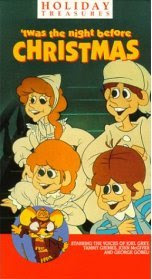This question is a stock theme in Christmas movies and specials, and I've always been fascinated by the treatment of it. In particular I spent way too much time as a kid contemplating the solutions found in Christmas specials such as The Year without a Santa Claus and that Rankin-Bass cartoon special with the mice of Twas the Night Before Christmas.

In The Year without a Santa Claus, I love the part where Santa Claus -- incognito -- heartfully sings "There's no question in my mind that he does exist!" That has got to be one of my all-time favorite lines anywhere in all of the literary arts just because it's so surreal. It's as if I were reading along in Pride and Prejudice and during one of their garden walks Elizabeth turns to Mr. Darcy and says "Wait a minute... Do we really exist or are we just fictional characters?"
 I don't know if all of you have seen that cartoon with the mice as many million times as I have, so since it's less famous, I'll give you a quick run-down: The nerdy poindexter too-smart-for-his-own-britches brainiac mouse writes a letter to the editor of the local paper explaining that Santa Claus doesn't exist, and Santa Claus takes offense and decides he won't be giving any presents to anyone in the whole town. (Nice, huh?) So the others convince poindexter to believe in Santa and to fix the town's special clock that was built to placate Santa with Christmas music.
I don't know if all of you have seen that cartoon with the mice as many million times as I have, so since it's less famous, I'll give you a quick run-down: The nerdy poindexter too-smart-for-his-own-britches brainiac mouse writes a letter to the editor of the local paper explaining that Santa Claus doesn't exist, and Santa Claus takes offense and decides he won't be giving any presents to anyone in the whole town. (Nice, huh?) So the others convince poindexter to believe in Santa and to fix the town's special clock that was built to placate Santa with Christmas music.The mouse cartoon has an interesting musical number that gives an intriguing argument against skepticism. (I'm typing this from memory, so feel free to correct me if I've made any errors):
There's more to the world than meets the eye,
when doubt's in your mind give your heart a try,
let up a little on the wonder why
and give your heart a try.
What would Spring be without the Easter Bunny?
Like a rainbow that doesn't end in money.
And a Valentine would certainly look stupid
without a cupid
so let his arrow in your heart.
That would be a start.
The musical number "I Believe in Santa Claus" (from The Year without a Santa Claus) has a similar theme. The skeptical kid's dad sings about seeing Santa himself as a kid and hearing Santa say to him the following:
"So you're too old for Santa Claus?"
he said with a smile,
"Then you're too old for all the things
that make a life worthwhile.
For what is happiness but dreams,
and do they all come true?
Look at me and tell me, son,
what is real to you."
Like I said, I've spent way too much time trying to figure out what these songs could possibly mean. I think it's very likely I've spent more time contemplating them than the songwriters did before they were recorded. And the more I try to figure them out, the more I feel like I'm Mr. Spock trying to make some sense of these unfathomable humans.
On the one hand, the two songs above seem to take a very negative and dismissive attitude towards people who refuse to let a little magic into their lives. Yet interestingly they seem to be arguing that you should believe your cherished myths even though they're not true. In other words, their argument against the skeptic is not that he's wrong, but rather that by pointing out that the myths are fiction, he's being a big spoil-sport and raining on everyone's parade.
The Polar Express is a more recent movie covering this same question, and one that -- thanks to my kids -- I'm well on my way to having seen and contemplated as much as I have these other two.

The Polar Express also seems to make the point that you should believe for the sake of believing. But it doesn't belabor the point with a musical number like the other two. This one takes an entirely different strategy, one which I find about a hundred times more hilarious. I don't know if they're just following the book or what, but these writers basically seem to have observed the following:
"Hey, if our goal is to convince the skeptical characters to believe in Santa Claus -- and we've set the story in a fantasy universe where Santa Claus really does exist -- why bother persuading the skeptics to overlook the lack of evidence? Why not just show them the evidence?"
So that's what they do. The doubting kids get a free train ride to the North Pole where they get to meet Santa in person, and see all of his magic in action -- the flying reindeer, stopping time at midnight, fitting billions of presents into a magic bag -- the works!!!

The result? The doubting kids are convinced that, yes, Santa Claus really does exist. I think that's the best solution ever to this problem!!! Hell, that'd be enough to convince me!!! :D
(As long as it was reproducible...)
Personally, I don't think it makes Christmas any less fun to realize that the Santa story is just fiction like many other fun stories we like to tell at Christmas time. That's what it was to me as a kid. I don't have any recollection of ever having thought that Santa Claus was real or of discovering he's not, and I'm certain that's the sort of thing my anecdote-oriented brain would have saved.
Even though my Dad wanted all of us kids to believe Santa was real, as far as I recall none of us ever did. I suspect that my mom may have been secretly slipping us hints that it's really just a fun story. My mom is a bit of a natural skeptic in that she's not shy about her opinion that it's absurd to believe in things like superstitions, astrology, ESP, etc.
You may be protesting right about now "But isn't she a believing Mormon?" It turns out that's a big part of it. The thing is that my mom likes to maintain a wall of separation between "Mormon truth" and other types of supernatural-not-backed-by-evidence beliefs that many people hold. She doesn't like people to notice parallels between the two.
After all, if we notice that the Santa story isn't real -- but we believe it just for the joy of believing -- there's a danger of wondering "Hmm, and what about that other Christmas story...?"







 I developed a whole elaborate theory about which parts of the script were paraphrased from the original, and which parts were made up by the screenwriter. As a guide, I assumed that original made sense, and blamed the screenwriter's additions to explain oddities like "Why is it Heat Miser and Snow Miser instead of Heat Miser and Cold Miser? Why does Snow Miser say they're 'step-brothers' if they have the same mom? Why are they called misers since they don't hoard heat or snow for themselves but instead do exactly the opposite?"
I developed a whole elaborate theory about which parts of the script were paraphrased from the original, and which parts were made up by the screenwriter. As a guide, I assumed that original made sense, and blamed the screenwriter's additions to explain oddities like "Why is it Heat Miser and Snow Miser instead of Heat Miser and Cold Miser? Why does Snow Miser say they're 'step-brothers' if they have the same mom? Why are they called misers since they don't hoard heat or snow for themselves but instead do exactly the opposite?"







